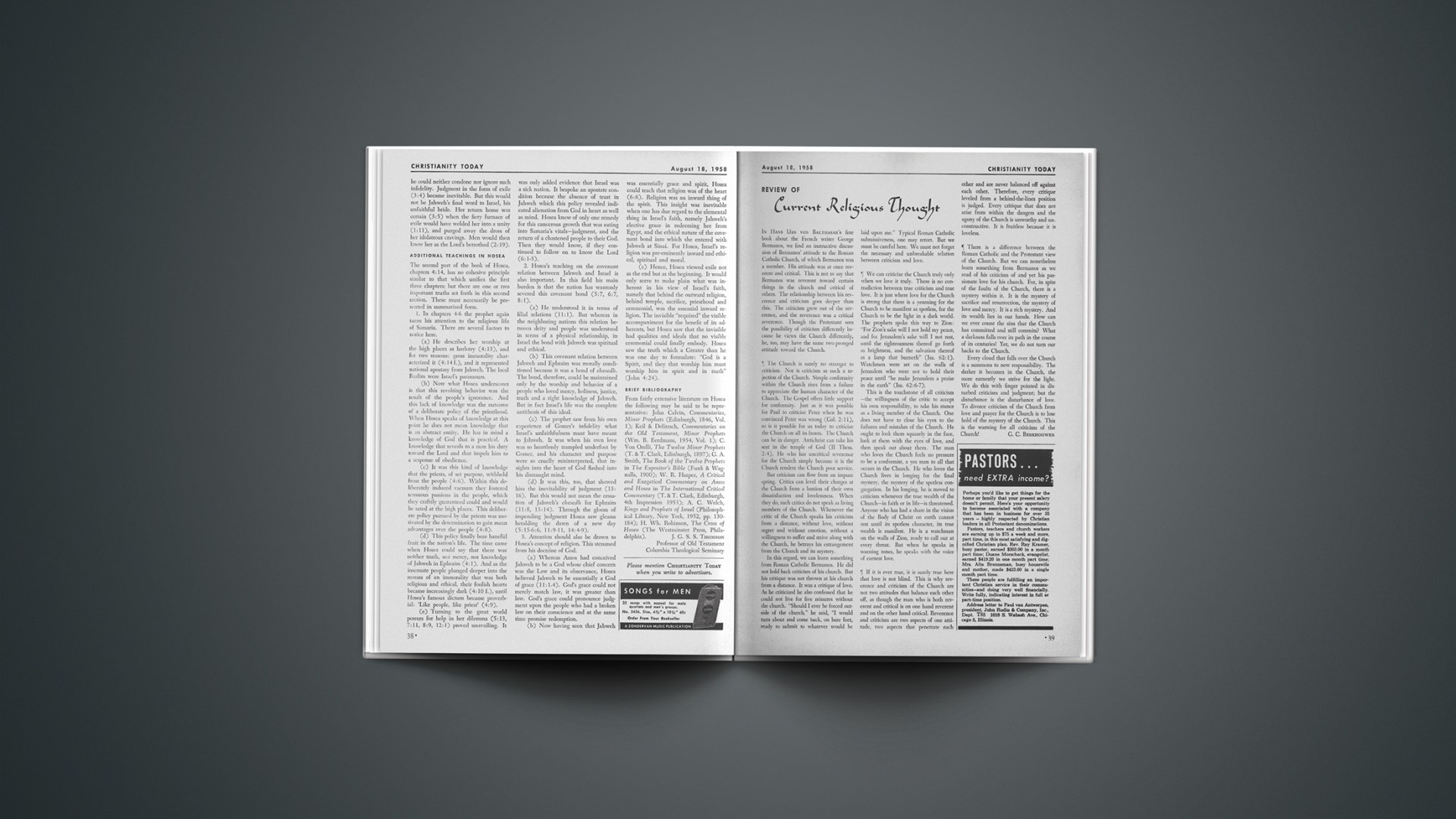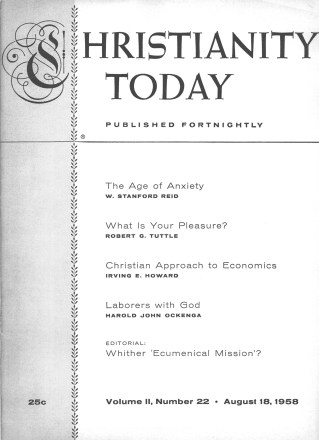In Hans Urs von Balthasar’s fine book about the French writer George Bermanos, we find an instructive discussion of Bermanos’ attitude to the Roman Catholic Church, of which Bermanos was a member. His attitude was at once reverent and critical. This is not to say that Bermanos was reverent toward certain things in the church and critical of others. The relationship between his reverence and criticism goes deeper than this. The criticism grew out of the reverence, and the reverence was a critical reverence. Though the Protestant sees the possibility of criticism differently because he views the Church differently, he, too, may have the same two-pronged attitude toward the Church.
The Church is surely no stranger to criticism. Nor is criticism as such a rejection of the Church. Simple conformity within the Church rises from a failure to appreciate the human character of the Church. The Gospel offers little support for conformity. Just as it was possible for Paul to criticize Peter when he was convinced Peter was wrong (Gal. 2:11), so is it possible for us today to criticize the Church on all its fronts. The Church can be in danger. Antichrist can take his seat in the temple of God (2 Thess. 2:4). He who has uncritical reverence for the Church simply because it is the Church renders the Church poor service.
But criticism can flow from an impure spring. Critics can level their charges at the Church from a bastion of their own dissatisfaction and lovelessness. When they do, such critics do not speak as living members of the Church. Whenever the critic of the Church speaks his criticism from a distance, without love, without regret and without emotion, without a willingness to suffer and strive along with the Church, he betrays his estrangement from the Church and its mystery.
In this regard, we can learn something from Roman Catholic Bermanos. He did not hold back criticism of his church. But his critique was not thrown at his church from a distance. It was a critique of love. As he criticized he also confessed that he could not live for five minutes without the church. “Should I ever be forced outside of the church,” he said, “I would turn about and come back, on bare feet, ready to submit to whatever would be laid upon me.” Typical Roman Catholic submissiveness, one may retort. But we must be careful here. We must not forget the necessary and unbreakable relation between criticism and love.
We can criticize the Church truly only when we love it truly. There is no contradiction between true criticism and true love. It is just where love for the Church is strong that there is a yearning for the Church to be manifest as spotless, for the Church to be the light in a dark world. The prophets spoke this way to Zion: “For Zion’s sake will I not hold my peace, and for Jerusalem’s sake will I not rest, until the righteousness thereof go forth as brightness, and the salvation thereof as a lamp that burneth” (Isa. 62:1). Watchmen were set on the walls of Jerusalem who were not to hold their peace until “he make Jerusalem a praise in the earth” (Isa. 62:6–7).
This is the touchstone of all criticism—the willingness of the critic to accept his own responsibility, to take his stance as a living member of the Church. One does not have to close his eyes to the failures and mistakes of the Church. He ought to look them squarely in the face, look at them with the eyes of love, and then speak out about them. The man who loves the Church feels no pressure to be a conformist, a yes man to all that occurs in the Church. He who loves the Church lives in longing for the final mystery, the mystery of the spotless congregation. In his longing, he is moved to criticism whenever the true wealth of the Church—in faith or in life—is threatened. Anyone who has had a share in the vision of the Body of Christ on earth cannot rest until its spotless character, its true wealth is manifest. He is a watchman on the walls of Zion, ready to call out at every threat. But when he speaks in warning tones, he speaks with the voice of earnest love.
If it is ever true, it is surely true here that love is not blind. This is why reverence and criticism of the Church are not two attitudes that balance each other off, as though the man who is both reverent and critical is on one hand reverent and on the other hand critical. Reverence and criticism are two aspects of one attitude, two aspects that penetrate each other and are never balanced off against each other. Therefore, every critique leveled from a behind-the-lines position is judged. Every critique that does not arise from within the dangers and the agony of the Church is unworthy and unconstructive. It is fruitless because it is loveless.
There is a difference between the Roman Catholic and the Protestant view of the Church. But we can nonetheless learn something from Bermanos as we read of his criticism of and yet his passionate love for his church. For, in spite of the faults of the Church, there is a mystery within it. It is the mystery of sacrifice and resurrection, the mystery of love and mercy. It is a rich mystery. And its wealth lies in our hands. How can we ever count the sins that the Church has committed and still commits? What a darkness falls over its path in the course of its centuries! Yet, we do not turn our backs to the Church.
Every cloud that falls over the Church is a summons to new responsibility. The darker it becomes in the Church, the more earnestly we strive for the light. We do this with finger pointed in disturbed criticism and judgment; but the disturbance is the disturbance of love. To divorce criticism of the Church from love and prayer for the Church is to lose hold of the mystery of the Church. This is the warning for all criticism of the Church!










